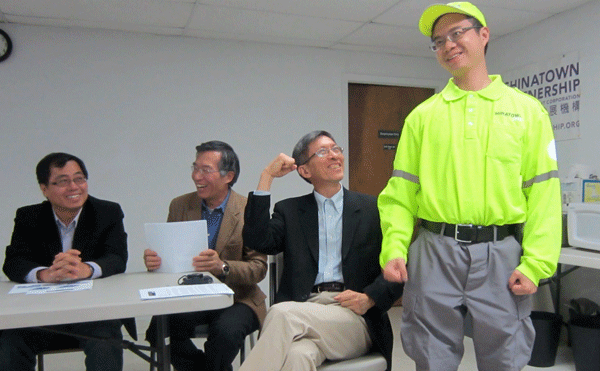
BY HELAINA HOVITZ | Chinatown is taking a second shot at cleaning up its act.
On Mon., Oct. 8, the Chinatown District Management Association, the neighborhood’s Business Improvement District, announced that a new sanitation initiative is officially underway. An eight-member Clean Team will be hitting the streets seven days a week between 7 a.m. and 5 p.m. to pick up trash, paint over graffiti and wipe down public fixtures, among other tasks. Two additional team members will be deployed on weekends to clean the area.
The service will resemble the Clean Streets initiative that began in late 2006, the outgrowth of an overwhelming request from local residents, business owners in a post-9/11 survey to improve sanitation in Chinatown.
A power-wash team will be charged with cleaning neighborhood streets, which are notorious for open-storefront fish markets that produce foul-smelling sidewalk run-off. In attempt to beautify the neighborhood, the team will be painting mailboxes, walls and fire hydrants, in addition to watering flowers and shoveling snow.
The BID also plans to install new signage that will direct people visiting the South Street Seaport or Ground Zero to Chinatown, according to BID Chair David Louie. “The streets are so dirty,” he said, “hopefully the community will notice the difference immediately.
“Chinatown isn’t just for Chinese food anymore,” Louie added. “We want to be able to guide visitors about where to eat, drink, shop and bank. This is just the first step for us — our larger goal is to help Chinatown’s small businesses.”
The BID’s board of directors is composed entirely of volunteers with the exception of Chinatown Partnership Local Development Corporation’s executive director, Wellington Chen, who is there to help put pressure on the public sector. The BID, he said, can advocate for change on behalf of community members who have made formal complaints to 3-1-1 and various other city agencies responsible for quality of life issues in the neighborhood.
“Like Hillary Clinton said, it takes a village,” said Chen of the need for community involvement. “We need storeowners, stakeholders, everyone to bring these things to our attention, and we’ll follow up with the [city] departments. If they know someone’s paying attention, we can get results.”
The BID’s sanitation program is supplemental — the city Departments of Transportation, Health and Mental Hygiene, Sanitation and Consumer Affairs all share the load. In order to keep tabs on the neighborhood, the BID has divided Chinatown into ten zones, a number BID officials said is subject to change.
A problem that recently surfaced, said Chen, is that bars are illegally dumping empty liquor bottles and other garbage in public trash bins. “Be forewarned, you’ll be publicly fined,” said Chen, referring to the fact that the BID would make sure the Sanitation Department followed up with the perpetrators.
While politicians like state Senator Daniel Squadron and city Comptroller John Liu successfully persuaded the city D.O.T. to repave several streets in the neighborhood, Chen said that these and other neighborhood streets must be properly maintained.
“There is a need for constant upkeep,” he said. “In a year or so, you’re going to have more potholes. It’s an ongoing process.”
The BID’s headquarters at 60 Saint James Place, which opened earlier this year, will serve as a type of community engagement center, according to Chen, who wants people to give feedback on the BID’s performance. “We want people to stop in and tell us what we’re doing well and what we’re not doing well,” he said. “We want to be held accountable and continue to try and improve.”
Through the sanitation initiative, the BID has created jobs for an estimated 30 people and has asked its contractor, Block by Block — a national service provider — to hire locally. According to Chen, there is still a long line of people applying for jobs.
The initiative will be maintained by a ‘special projects ambassador’ who will work year-round. The program also comprises a 900-hour initial blitz to power-wash the streets, paint the fire hydrants and perform other work designed to immediately improve street conditions in Chinatown.
The Chinatown District Management Association is a nonprofit formed in 2011 by neighborhood property owners, city officials and other stakeholders — despite fierce opposition to the initiative by a group of community members. The BID’s catchment area, which spans 60 blocks, is bordered by Broome Street to the north, White, Worth and Madison Streets to the south, Broadway to the west and Allen and Rutgers Streets to the east. It is financed by local property owners.





































